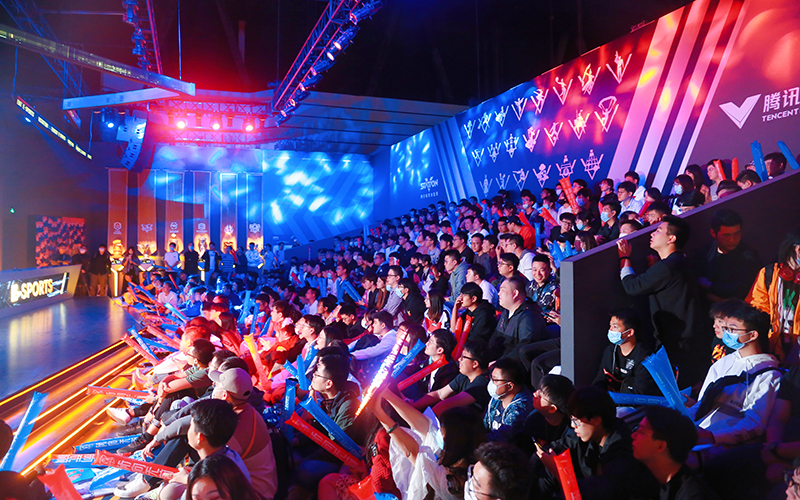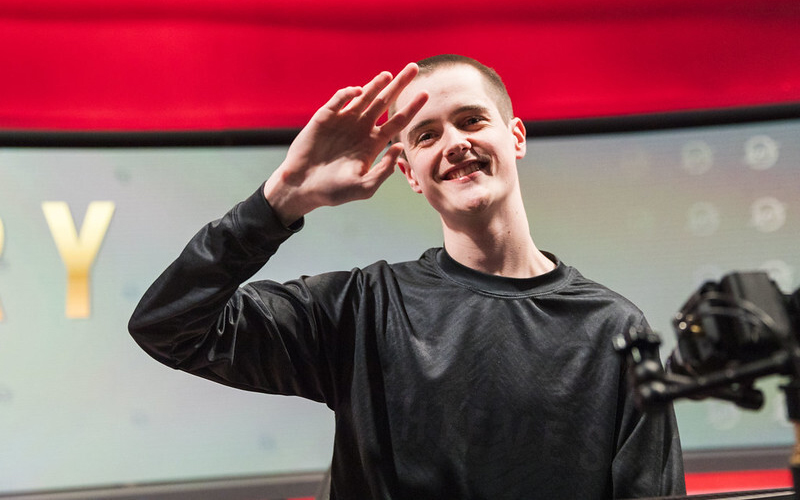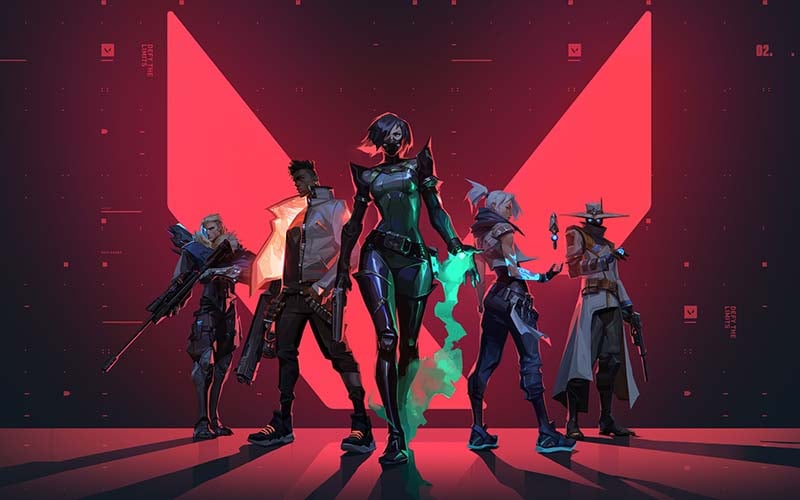
Turning professional for esports players isn’t easy, but there is clearly a strong following for those able to make the leap, as this televised League of Legends World Championship event reveals. (Photo by Feature China/Future Publishing via Getty Images)
PHOENIX – Max Wang is graduating from Arizona State at a crossroads in his future. Although the stability of a 9-to-5 career is the easiest option to pursue, the allure of competing as a professional in a sport he’s dedicated nearly his whole life to seems too good to pass up.
“It really is an instance of following your dreams,” Wang said. ”If I went and got a job right now, I might love or hate it. I would always feel some sort of sense of regret of all the time I put into competing in esports and never actually accomplishing it.”
As a member of the ASU Esports Valorant Maroon team, Wang and his teammates have grown into another formidable roster on the growing list for the student-run organization. Valorant is a tactical first-person shooter developed by Riot Games.
Wang is the only member graduating this semester and has an eye on pursuing a career in Valorant. For Wang, much of the decision comes back to the word “stability” as he enters a new phase in his esports journey.
“But my parents, I never told them I play for the team. They know I’m a big gamer and that I used to compete,” Wang said. “Even now, I remember telling my mom about the LAN and she didn’t really get it and was a little apprehensive, cautioning me not to spend so much of my time on video games.”
For esports players like Wang with eyes toward the top, “going pro” is less of a direct path than some of the options found in college sports. There’s no true college-to-pro pipeline for players to follow. There’s no draft. Even a modicum of national recognition is reserved for the top players at well-funded, connected and elite programs.
The main similarity between college sports and esports is the unlikelihood of finding success at the highest professional level. Since ASU Esports was established in 2017, only five players from ASU men’s basketball team have made it into the NBA: Josh Christopher, Rob Edwards, Zylan Cheatham and Luguentz Dort.
In the same period, two players from the similarly successful ASU League of Legends roster have made it onto League of Legends Championship Series academy teams: Brindon “Breezyyy” Keesey and Jason “MaGeRdAsGeR” Magerkurth.

Brindon “Breezyyy” Keesey from the successful ASU League of Legends roster made it onto the League of Legends Championship Series academy team. (Photo courtesy of Riot Games)
Putting in the hours
Wang said in order to maximize his chances of reaching his peak, he’d need to commit more time to improving at the game. ASU Maroon’s five-person roster scrimmages twice a week and competes in weekend tournaments. The team’s practices are supplemented by individual practice on the ranked ladder.
“I would be more capable of managing my time and having a little less of my load and commit to Valorant,” Wang said. “That time is critical to growing as a player to the level of competitiveness that would equate to what pro players do. That is their job.”
These lofty dreams are backed by tangible skill showcased throughout the semester by ASU Maroon. The squad finished the year with an emphatic victory at the Pure Esports LAN in Mesa on April 3.
ASU Maroon accomplished an undefeated bracket run, defeating other college teams like ASU Gold and Grand Canyon University along with several local, high-level pickup teams. The roster is composed of Wang, Kayla Nguyen, Eric Yoon, Keenan Nutter and Sathiya Kumaraguru.
“It’s indescribable with words the amount of joy I felt seeing my teammates in person,” Wang said. “This is a predominantly online game. Through voice you can read tone or frustration, but it’s a different environment playing next to each other. The core values – trust and admiration for each other – you can see it in a physical and tangible way. The hype, the disappointment, I can’t tell you how alive I felt.”
That atmosphere was heightened with around 30 to 40 players there to play Valorant. Both Yoon and Kumaruguru noted how inspiring it was to be in that environment. “It’s weird seeing everyone so passionate about the game and their sole purpose was to win everything,” Yoon said.
With their competitive fires stoked, ASU Maroon saw their best success of the semester against what some players on the team would admit were technically more skilled talent. But that’s why the games are played. Kumaraguru said in many of the small, third-party tournaments they play in, the opponents should be significantly better, yet ASU Maroon plays them close.
Kumaraguru said after the tournament they continued to play online and ran through the competition on the ranked ladder, proving to the team the day was a real level-up moment.
“The LAN, I thought we were going to lose but our confidence is growing,” Kumaraguru said. “We’re believing we can do it and it wasn’t a fluke run.”
This isn’t to say ASU Maroon aren’t a high-level team themselves. All of the players play in the upper-tier of Immortal on the ranked ladder, which means they are within the top 0.7 percent of players in a game that boasts over 15 million average monthly players.
However, several teams in Mesa had players that were ranked at Radiant, the highest level on the ranked ladder. This skill difference is difficult to overcome. Map knowledge, aim mechanics and utility usage are factors that separate players from one another. Yoon identified the core to ASU Maroon’s success: teamwork.
Common goal
A culture of selflessness developed among the team throughout the semester. Each player spoke about their willingness to sacrifice individual success for team results. This culture is set by Nutter, team captain and in-game leader, who was nominated as captain after three players from the fall 2021 roster graduated.
Nutter described this as a rebuilding year, integrating Yoon, Nguyen and Kumaraguru into the fold with Wang and himself as returning members.
As Nutter stepped into the captain role, he developed a more measured, mature approach to competition that is mirrored in his teammates.
“When I’m trying to structure practices and learn from scrimmages you start to notice ranked habits – no comms and hero plays,” Nutter said. “If you’re in a match you have to stay structured and patient. There’s a difference between how it’s supposed to look in ranked versus a tournament.”
Success on the ranked ladder often comes with bad habits. Vocal communication is sparse and hero plays are necessary because its impossible to truly trust their patchwork, fleeting ranked teammates. The ranked mindset doesn’t work in a competitive environment and will get punished by experienced rosters. These habits have largely been stamped out in ASU Maroon and it stems from their trust in one another.
“I give a lot of credit to Keenan,” Yoon said. “He drives our team to become better. I trust my teammates. They have my back if I’m playing bad.”
Wang said this iteration of ASU Maroon is the best team environment he has ever experienced. The foundation of trust they rest upon is built on mutual respect and admiration for each other.
Plenty of teams trust each other based on raw mechanical skill. If a player is good, you can comfortably expect them to pop off. If they weren’t capable, then why would they be on the roster? Genuine trust stems from a sincere belief in your teammates, regardless of the odds, Wang said.
“It’s this X-factor that you believe in your teammates and your team believes in you,” Wang said. “I’m proud of the communication and trust we’ve built from getting to know each other, having that combination of trust in skill and trust fostered by mutual adoration.”
Unlike previous teams he’s been on, ASU Maroon has an unshakable mental, Wang said. He said the team is capable of putting aside their emotions and fight through the “calamity and chaos” to find a solution.
Such a dynamic and positive team environment should greatly benefit Wang and Nguyen as they pursue their professional careers. Even though both had team experience, the lessons they learned in selflessness and what a positive culture look like will prove invaluable.
Challenges for female players
Nguyen is ending her freshman year as one of the more accomplished players on the roster with previous experience in the blossoming women’s scene in Valorant. She said she’s all in on becoming one of the best Valorant players in the world and already has experience competing with the top women in the scene.
Alongside the plethora of hurdles players face entering the esports scene, women experience unique barriers that account for the discrepancy between women and men at the top level of college and professional play.
These barriers include in-game harassment, which pushes women out of the scene before they can pursue their professional aspirations. Even once they get in the scene, online harassment and interpersonal predjudice from men can turn esports into a uninhabitable environment for women.
“I don’t tolerate any of that behavior, so if I ever meet someone weird in my game I just instantly mute,” Nguyen said. “I don’t know why people think that doing that is OK. Guys think they’re joking around but have to realize that it makes the other person uncomfortable. They’re not being considerate or thoughtful of other players.”
Riot Games, publishers of Valorant, has taken tangible steps to support women in the Valorant scene and provide them avenues to play at a high level and get their names out there, alongside Galorants, a Discord server for women in Valorant, and Nerd Street Gamers, the Valorant Champions Tour Game Changers and Game Changers Academy.
The Game Changers tournament circuit is intended to create more opportunities and exposure for women and people of marginalized gender identities. Many of the top organizations in esports, like TSM and Cloud9, field strong rosters in VCT Game Changers.
Nguyen is an active member of Galorants and competed in several Game Changers Academy brackets for Voyager Esports, Saturn Rose and a handful of other teams. She has gone up against the likes of Dignitas and Man I Love Fwogs, two elite rosters in VCT Game Changers.
“Valorant is getting bigger and bigger and I’m happy that more girls are like coming forward and competing, showing that girls can play, too,” Nguyen said. “There’s a lot of sexism in the Valorant community, so I’m very happy that we can compete.”
Still, for Nguyen and Wang the concept of “going pro” is an unclear path. Finding a team and competing in VCT doesn’t entirely mean you’ve “made it.” The road ahead is long, however, and fall semester may mark a clearer path for many of the professional Valorant hopefuls in college.
Starting in the fall, the Riot Scholastic Association of America will begin sponsoring an official college tournament similar in scope to the College League of Legends system. This should improve the current, more decentralized system when college rosters have to search for third party events.
With a Riot-sponsored tournament, many see this as an opportunity to get more exposure and dedicate themselves further with the benefits of a more structured environment.
“The only way to get your name out there is to either stream or roll people when they’re streaming,” Yoon said. “Playing at a high level is another good way and everyone’s going to be looking at the new Riot league.”
For Wang, it’s bittersweet that his departure from the Valorant team comes right as this exciting new opportunity enters the college space, especially considering how strong the team’s bond is after even one semester of competing.
“I am sad that I don’t get to spend more time developing this team because I do have so much admiration and trust in each and every one of them,” Wang said. “I think its a disappointing thing to miss out, but I’m glad I had the chance and I’m grateful for that.”
Wang won’t be the only one to experience these mixed emotions. As ASU Esports continues its growth, the players and staff of today will likely leave the club feeling like they’re going to be missing out. To Nutter, the upcoming college Valorant league is another step in building up to a future where ASU Esports is able to provide greater resources and opportunities for aspiring gamers.

